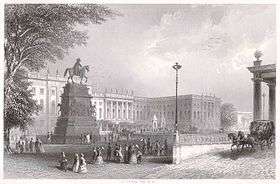Humboldt's Ideal

Humbold's ideal of education refers to the holistic education of the arts in conjunction with the respective study direction. This ideal goes back to Wilhelm von Humboldt, who in the time of the Prussian reforms relied on a growing educated middle-class and thereby promoted the claim on general education. Today, the term often refers to the central idea of the unity of research and teaching at universities and various other institutes of higher education (in contrast to pure teaching professorships without research obligation).
Term Reference
Humboldt, as head of the ministry of culture and public education in the Prussian Interior Ministry, incorporated this ideal into educational reforms. In the actual policy it did not extend to the Prussian elementary schools, which also came under the section next to the universities. Occasionally it is therefore alternatively referred to as Humbold's university ideal.
Historic Overview
Humboldt's educational ideal developed around two central concepts of public education: The concept of the autonomous individual and the concept of world citizenship. The university should be a place where autonomous individuals and World Citizen are produced at or more specifically, produce themselves.
- An autonomous individual is to be an individual who attains self-determination and responsibility through his use of reason.
- "The Weltbürgertum is the collective bond, which connects autonomous individuals, irrespective of their social and cultural socialization: Humboldt says: 'To transform the world as much as possible into one's own person is, in the higher sense of the word, living'. The endeavor shall aim at working through the world comprehensively, and thereby unfold as a subject. To become a citizen of the world means, to deal with the big questions of humanity: to seek peace, justice, and care about the exchange of cultures, other gender relationships or another relationship to nature."[1] University education should not be job-focused, but educational training that is independent of economic interests.
Academic freedom describes independence of the university from outside governmental and economic constraints. The university is to evade government influence. Humboldt demands that the scientific institution of higher education should loose itself "from all forms within the state". Therefore, his concept of university planned, for example, that the University of Berlin should have its own goods in order to finance itself and thereby secure its economic independence. Academic freedom also demands, next to independence of the university from outside governmental and economic constraints, the independence from within; i.e. free choice of study and free organization of studies. The University should therefore be a place of permanent public exchange between all involved in the scientific process. The integration of their knowledge shall be pursued with the help of philosophy. Philosophy is supposed to represent a kind of basic science, which allows members of different scientific disciplines to bring an exchange of their discovery and to link them together. Humboldt's educational ideal formed German University History decisively for a long period, albeit it was never realized practically in its entirety or cannot be realized. Great intellectual achievements of German science is linked to it.
Georg Wilhelm Friedrich Hegel, Karl Marx, Friedrich Nietzsche, Sigmund Freud, Theodor W. Adorno and Albert Einstein confessed themselves to it.
Current Situation and Development
While during Humboldt's time universities mainly conducted state-organized academic research, there are now in Germany's tertiary education new forms of higher education, which now all have a scientific mission to research.[2] The demands of Humboldt's ideal of education can therefore be applied on all German universities.
Critics see in many current reforms, such as the Bologna process, a departure from Humboldt's ideal towards greater occupational studies with economic interests. Furthermore, it is criticized that the freedom of teaching is restricted by the Bologna process.
Literature
- Integration der handwerklich-militärischen Chirurgenausbildung in die akademische Medizinerausbildung unter Johann Goercke.
- Baumgart, Franzjörg: Zwischen Reform und Reaktion. Preußische Schulpolitik 1806-1859, Darmstadt: Wissenschaftliche Buchgesellschaft 1990
- Humboldt und die Universität heute : Symposium des Bundesministeriums für Bildung und Wissenschaft am 17. April 1985 im Wissenschaftszentrum Bonn / Bundesministerium für Bildung und Wissenschaft, Bonn
- Dietrich Benner, Wilhelm von Humboldts Bildungstheorie (Broschiert), Weinheim: Juventa, 3., erw. A. 2003
- Ulrike Büchner: Arbeit und Individualisierung : zum Wandel des Verhältnisses von Arbeit, Erziehung und Persönlichkeitsentfaltung in Deutschland, Weinheim ; Basel : Beltz, 1982
- Helmholtz, Hermann von, Über die Akademische Freiheit der deutschen Universitäten, Rede beim Antritt des Rektorats an der Friedrich-Wilhelms-Universität zu Berlin am 15. Oktober 1877 gehalten, Nachdr. der Ausg. Berlin, Hirschwald, 1878, Hrsg.: Universitätsbibliothek der Humboldt-Universität zu Berlin 2005
- Humboldt, Wilhelm von: Bildung und Sprache, Paderborn: Schöningh, 5., durchges. Aufl. 1997
- Humboldt, Wilhelm von: Schriften zur Politik und zum Bildungswesen, Darmstadt: Wissenschaftliche Buchgesellschaft, 6. Auflage 2002
- Humboldt, Wilhelm von: Ideen zu einem Versuch, die Grenzen der Wirksamkeit des Staats zu bestimmen, Stuttgart: Reclam, 1986, ISBN 978-3-15-001991-7 - schon in seinem Frühwerk bemüht sich Humboldt sein Bildungsideal zu formulieren
- Knoll, Joachim H. u. Siebert, Horst: Wilhelm von Humboldt. Politik und Bildung, Heidelberg: Quelle u. Meyer, 1969
- Menze, Clemens: Die Bildungsreform Wilhelm von Humboldts, Hannover: Schroedel 1975
- Richter, Wilhelm: Der Wandel des Bildungsgedankens. Die Brüder von Humboldt, das Zeitalter der Bildung und die Gegenwart. (= Historische und Pädagogische Studien 2), Berlin: Colloquium-Verlag, 1971
- Schultheis, Franz (Hrsg.) ; Cousin, Paul Frantz (Hrsg.) ; Roca i Escoda, Marta (Hrsg.): Humboldts Albtraum - Der Bologna-Prozess und seine Folgen. Konstanz : UVK, 2008.- ISBN 978-3-86764-129-6.
- Tschong, Youngkun, Charakter und Bildung : zur Grundlegung von Wilhelm von Humboldts bildungstheoretischem Denken, Würzburg: Königshausen & Neumann, 1991
- Wagner, Hans-Josef, Die Aktualität der strukturalen Bildungstheorie Humboldts, Weinheim: Dt. Studien-Verl., 1995
References
- ↑ Jürgen Hofmann: Welche Bedeutung hat das Humboldt'sche Erbe für unsere Zeit?
- ↑ vgl. Hochschulgesetze der Länder
External links
- Wilhelm von Humboldts Idee der Universität
- Jürgen Hofmann: Welche Bedeutung hat das Humboldt'sche Erbe für unsere Zeit?